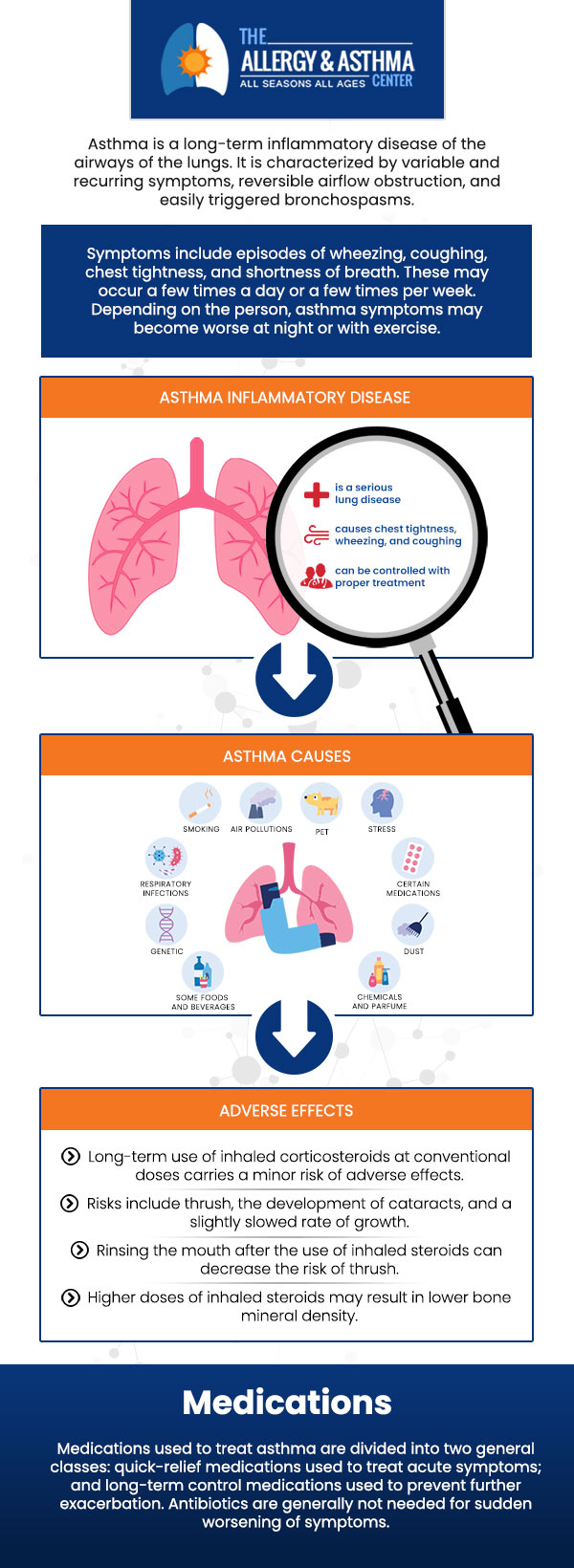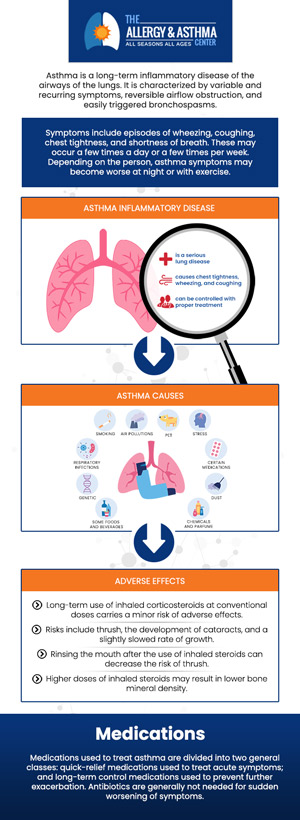Asthma Signs and Symptoms Q&A
Asthma commonly manifests with wheezing, coughing, and shortness of breath, particularly during physical exertion or exposure to triggers. Timely recognition and management of these symptoms are crucial for controlling asthma and preventing complications. Treatment typically involves medications such as inhalers, along with lifestyle adjustments and avoidance of triggers. For personalized care and guidance, consult Dr. Jon E. Stahlman, MD, at The Allergy & Asthma Center. For more information, please contact us or book an appointment online. We serve patients from Lawrenceville GA, Atlanta GA, Conyers GA, Suwanee GA, Duluth GA, Grayson GA, Decatur GA, Brookhaven GA, Lithonia GA and Covington GA.




Table of Contents:
What are 5 signs I have asthma?
What is the best treatment for asthma?
What is an asthma flare-up?
Can asthma make you feel sick?
Asthma is a common chronic lung disease characterized by the narrowing and swelling of the airways, leading to difficulty in breathing. This condition can present alongside various signs and symptoms that can be identified as 5 primary warning signs.
Among the early signs to watch out for is coughing, which is a prevalent symptom that may intensify with temperature changes, during physical exertion, or at night. This coughing can become chronic and warrants clinical attention to rule out asthma or other underlying conditions.
Another significant indicator is wheezing, experienced by most individuals with asthma, signaling the tightening and inflammation of the airways. Shortness of breath is also a common symptom, as the inflamed and irritated airways restrict airflow.
Additionally, individuals may experience chest discomfort and tightness, particularly as inflammation increases, potentially leading up to an asthma attack.
Excess mucus production due to irritation in the airways can exacerbate breathing difficulties. Recognizing these symptoms is an important component of managing asthma flare-ups. However, it is challenging for individuals to identify asthma on their own due to the overlap with other conditions, emphasizing the importance of seeking medical advice from specialists like those at the Allergy & Asthma Center.
The best asthma treatment varies according to individual needs. The goal of asthma treatment is to control symptoms, minimize medication side effects, and prevent asthma attacks. Given that asthma is a lifelong condition without a cure, healthcare providers at the Allergy & Asthma Center work closely with patients to develop personalized treatment plans based on the nature and severity of their asthma.
This comprehensive approach may include an asthma diary to track symptoms and identify triggers, at-home lung tests, and lung function tests to monitor lung health. Treatment typically involves medications and inhalers for quick symptom relief and long-term asthma control, often including inhaled corticosteroids and a combination of inhaled medicines.
The best treatment varies for each patient, tailored to their experiences and symptoms. The specialists at the Allergy & Asthma Center not only devise these personalized plans but also offer guidance on health and lifestyle changes, emergency response, symptom monitoring, and trigger avoidance to ensure effective asthma management.
An asthma flare-up, or attack, is a sudden worsening of asthma symptoms triggered by various factors, including allergens, illnesses like colds or flu, cold air, physical activity, and environmental irritants.
These flare-ups result in severe coughing, wheezing, and shortness of breath beyond the regular symptoms of asthma. Even well-controlled asthma can experience flare-ups, highlighting the importance of adhering to a treatment plan that includes long-term control medications and understanding how to avoid potential triggers.
During a flare-up, the airways become more inflamed and swollen, and mucus production can clog the airways further, making it challenging for air to pass through. Managing asthma effectively and knowing the steps to take during a flare-up is crucial to preventing these severe exacerbations and maintaining overall lung health.
While asthma primarily affects the airways and breathing, it can, in some cases, contribute to feelings of sickness, especially during an asthma attack. Unusual symptoms accompanying asthma attacks, such as nausea, excessive sweating, or fever, are unusual and may warrant immediate medical attention as they could indicate serious complications.
Uncontrolled asthma can increase susceptibility to sickness in various ways, including disrupting sleep patterns and overall well-being. Consistently experiencing asthma symptoms can lead to generally feeling unwell, emphasizing the importance of effective asthma management. Individuals who feel sick as a result of their asthma should consult their healthcare provider at the Allergy & Asthma Center to address these symptoms. Proper asthma management should alleviate these feelings of sickness, enabling individuals to live well with their condition without it significantly impacting their daily lives.
Asthma can significantly impact daily life, but with proper management, individuals can lead fulfilling and active lifestyles. By partnering with Dr. Jon E. Stahlman, MD, at the Allergy & Asthma Center, patients gain access to personalized care and effective treatment strategies. Together, we can navigate asthma’s challenges, empowering individuals to breathe easier and live life to the fullest. For more information, please contact us or book an appointment online. We serve patients from Lawrenceville GA, Atlanta GA, Conyers GA, Suwanee GA, Duluth GA, Grayson GA, Decatur GA, Brookhaven GA, Lithonia GA and Covington GA.

Additional Allergy & Asthma Services
▸ Allergy Shots
▸ Allergy Testing
▸ Asthma
▸ Bronchodilators
▸ Drug Allergy
▸ Food Allergy
▸ Insect Allergy
▸ Nasal/Sinus Allergies
▸ Pediatric Allergy
▸ Pediatric Asthma
▸ Skin Allergy
▸ Spring Allergies




